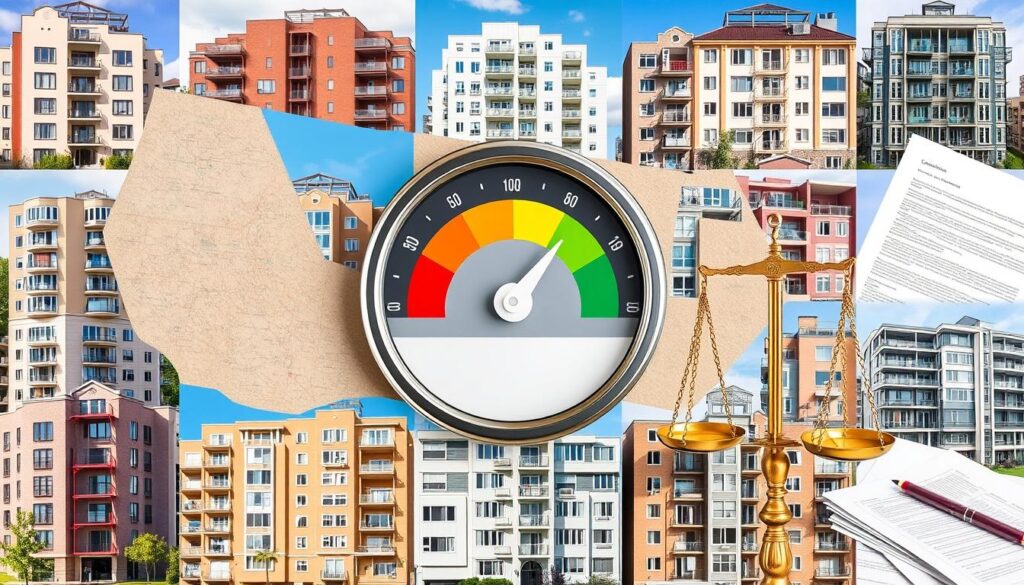Renting an apartment isn’t just about finding the perfect space. Landlords also check your credit to gauge financial responsibility. Credit score requirements for rentals vary widely.
Landlords set their own thresholds based on market demand, location, and renter risk. Knowing typical credit requirements can help you prepare for rental applications.
Understanding these standards can boost your chances of approval. It’s crucial to know what landlords look for in a tenant’s credit profile.
Key Takeaways
- Landlords often have minimum credit score requirements for rental applications, which typically range from 600-700.
- Factors like payment history, credit utilization, and credit mix influence rental credit score criteria.
- Building credit through responsible financial habits can help meet landlords’ credit standards for apartment leasing.
- Alternatives like security deposits, co-signers, or specialty rental programs may assist those with poor credit in securing an apartment.
- Effectively communicating credit challenges to potential landlords can improve rental approval odds.
What is an Acceptable Credit Score for Renting an Apartment?
Landlords often look for credit scores between 600 and 700 when renting apartments. The exact score needed can change based on various factors. These include the landlord’s preferences and the local rental market.
Understanding Landlord Credit Score Requirements
Credit scores help landlords gauge a tenant’s financial responsibility. Higher scores suggest a lower risk of missed rent payments. Some landlords accept tenants with scores as low as 600.
Others may require scores of 650 or even 700. The specific requirement depends on the landlord and property type.
Factors That Impact Rental Credit Score Criteria
Several elements influence a landlord’s credit score requirements. These include the local rental market and the landlord’s financial situation. The type of property being rented also plays a role.
In competitive markets, landlords can be more selective. They might set higher tenant credit score standards. Owners of luxury properties may have stricter rental credit criteria than those renting affordable units.
| Credit Score Range | Rental Approval Likelihood |
|---|---|
| 700 and above | Very high |
| 600-699 | Good |
| Below 600 | Challenging |
Higher credit scores increase your chances of securing a rental. Scores of 700 or above are most likely to be approved. Scores below 600 may make finding a willing landlord difficult.
Average Credit Score to Rent an Apartment
The average credit score for renters in the US is about 650. This number isn’t set in stone. Credit requirements can change based on landlord policies and local rental markets.
Landlords often use credit scores to evaluate rental applications. A higher score can show responsible financial management. This may boost chances of securing a rental property.
A lower score might lead to more scrutiny or application rejection. Local market conditions and property location can affect credit score requirements. Competitive markets may have higher thresholds to reduce risks.
“The average credit score for renters is a general guideline, but it’s not a one-size-fits-all requirement. Landlords have the flexibility to set their own credit score criteria based on their specific needs and the local market conditions.”
Understanding average credit score to rent an apartment helps prospective tenants prepare. Knowing credit requirements for rental in your area can increase chances of securing desired properties.

Credit Score Ranges and Rental Approval Chances
Your credit score greatly influences your chances of renting an apartment. Landlords often set credit thresholds for leasing. Understanding how credit scores affect your rental prospects is crucial.
Applicants with credit ratings above 700 are more likely to be approved. They usually have strong payment histories and low credit utilization. These factors make them attractive tenants.
| Credit Score Range | Rental Approval Chances |
|---|---|
| 800-850 | Excellent |
| 740-799 | Very Good |
| 670-739 | Good |
| 580-669 | Fair |
| 500-579 | Poor |
| 499 or below | Very Poor |
Applicants with credit scores in the 600s to 700s may still be approved. They might need to provide extra information or guarantors. Those with credit ratings below 600 may face more challenges.
Credit score requirements can vary by property and landlord. Some may be more lenient, while others have stricter credit thresholds for rentals. Knowing these ranges can help you prepare for your apartment search.
Building Your Credit to Meet Rental Standards
Improving your credit score is vital for meeting rental property requirements. Focus on two key factors: payment history and credit utilization. These elements significantly impact your creditworthiness for potential landlords.
Payment History and Credit Utilization Tips
Your payment history greatly affects your credit score. Make all payments on time to boost your creditworthiness. Set up automatic payments or reminders to avoid missed deadlines.
Work on lowering your credit card balances. This improves your credit utilization ratio, a major factor in determining rental eligibility.
- Make all payments on time, every time
- Reduce your credit card balances to improve utilization ratio
- Consider becoming an authorized user on a parent or spouse’s account with a long history of on-time payments
- Dispute any errors on your credit report that may be dragging down your score
Focus on these key areas to build a stronger credit profile. Consistent progress will increase your chances of securing your desired rental property.

“Improving your credit score is one of the best investments you can make when it comes to renting an apartment. It can open doors and save you money on deposits and fees.”
Alternatives for Renting with Poor Credit
Don’t let a low credit score dash your rental dreams. There are still ways to secure housing. Let’s explore some options that can help you find a place to call home.
Finding Lenient Landlords
Some landlords look beyond credit scores. They consider your whole financial picture. Search for property managers who value employment history and timely rent payments over credit reports.
Securing a Co-Signer
A co-signer with good credit can boost your chances. Their strong credit profile can help overcome your challenges. This strategy often improves your approval odds significantly.
Exploring Short-Term Rental Options
Short-term rentals often have looser credit requirements. Consider month-to-month arrangements as a temporary solution. This gives you time to improve your credit score.
With creativity and persistence, renting with poor credit is possible. Explore these options for renting with low credit to find your new home.
Explaining Low Credit Scores to Potential Landlords
Renting with a low credit score can be tough. But it’s not impossible. Be honest and open when talking to landlords. A strong rental application letter can show you’re responsible, even with poor credit.
Crafting a Persuasive Rental Application Letter
A good rental application letter is a powerful tool. When discussing your low credit score, explain what caused it. This could be medical bills, job loss, or unexpected money problems.
Show your commitment to financial stability. Offer extra proof or security deposits to ease the landlord’s worries. This can help build trust.
In your letter, make sure to:
- Explain the reasons for your low credit score in a clear and concise manner
- Highlight your current financial situation, including your steady income and employment history
- Outline your plan to maintain timely rent payments and be a responsible tenant
- Offer to provide references, additional security deposits, or co-signers to demonstrate your trustworthiness
“Honesty and transparency are key when communicating low credit to landlords. By crafting a rental application letter with poor credit, you can showcase your financial responsibility and build trust with potential landlords.”
A personal and sincere approach can help convince landlords. They may look past your low credit score. This gives you a chance to prove you’re a good tenant.
The Impact of Credit Score on Rental Deposits and Fees
Your credit score can greatly affect rental deposits and fees when renting an apartment. Landlords use credit scores to gauge financial responsibility. Lower scores often lead to higher upfront costs.
A lower credit score can result in increased security deposits. Landlords may see tenants with poor credit as risky. They might ask for a larger deposit to protect themselves.
Credit scores can also influence other rental fees. These may include application fees or move-in charges. Landlords might charge higher fees for those with lower scores.
To reduce credit score impact on rental costs, take steps to improve your creditworthiness. Pay down debts and dispute any errors on your credit report. Show a history of responsible financial management.
These actions can help secure better rental terms. You may enjoy lower deposits and fees as a result.
| Credit Score Range | Potential Impact on Rental Deposits | Potential Impact on Rental Fees |
|---|---|---|
| Excellent (760-850) | Minimal or no additional deposit required | Minimal or no additional fees |
| Good (700-759) | Slight increase in deposit, typically 1-2 months’ rent | Slight increase in fees, typically 1-2 times the standard application fee |
| Fair (600-699) | Moderate increase in deposit, typically 2-3 months’ rent | Moderate increase in fees, typically 2-3 times the standard application fee |
| Poor (500-599) | Significant increase in deposit, typically 3-6 months’ rent | Significant increase in fees, typically 3-6 times the standard application fee |
| Very Poor (499 or below) | Landlord may require a co-signer or refuse to rent to the applicant | Landlord may refuse to rent to the applicant or charge exorbitant fees |
Understanding how credit score on rental deposits and fees affects you helps prepare for renting. It allows you to take steps to reduce extra costs. A good credit score helps secure rentals and save money long-term.
State Laws on Credit Checks for Rental Applications
Landlords often use credit checks to screen potential tenants. However, laws about this practice differ across states. Knowing these state laws on rental credit checks is vital for landlords and tenants alike.
Some states have specific rules for rental application credit checks. California requires written notice for credit report use. New York limits credit info use, especially for affordable housing.
Many states ban considering certain credit info types. These may include medical debt or student loans. Some also limit fees for credit checks and screening reports.
- Some states prohibit landlords from considering certain types of credit information, such as medical debt or student loans, when evaluating rental applications.
- Several states have also implemented laws that restrict the fees landlords can charge for conducting credit checks or obtaining tenant screening reports.
Both landlords and tenants should know their state’s laws and regulations. This knowledge ensures a fair rental process. It also protects the rights of all parties involved.

“Understanding the legal landscape surrounding credit checks for rental applications can be the key to a successful rental experience for both landlords and tenants.”
Finding Rental-Friendly Property Management Companies
Seeking property managers who are flexible with credit requirements is crucial for those with lower scores. These landlords often work with applicants who have less-than-ideal credit. This approach makes renting more accessible for many people.
Here are strategies to find rental-friendly property management companies:
- Reach out to local real estate agents or rental listing websites. They may know landlords with flexible credit policies.
- Check online reviews for property management companies in your area. Look for mentions of flexible credit requirements.
- Attend local rental housing events or industry gatherings. Networking can help you find rental-friendly property management companies.
- Ask around in your community, like at churches or community centers. Word-of-mouth referrals can lead to apartment rentals with flexible credit requirements.
Research and identify rental-friendly property management companies to boost your chances of renting. This approach can help even with a less-than-perfect credit history.
| Rental-Friendly Property Management Companies | Credit Score Requirements |
|---|---|
| ABC Property Management | Minimum credit score of 600 |
| XYZ Rentals | Flexible credit requirements, case-by-case basis |
| Acme Property Solutions | No minimum credit score, focus on income and references |
Mitigating Risk Factors for Landlords Beyond Credit Scores
Credit scores are vital in rental approvals, but landlords consider other factors too. Tenants can provide extra information to show financial stability. This can help offset concerns about imperfect credit scores.
Employment and income history are key factors landlords may evaluate. Pay stubs, tax returns, or employment letters can reassure landlords about payment ability. Proof of on-time utility or phone payments can also strengthen an application.
- Rental history, including references from previous landlords, can also be a valuable asset for applicants.
- Landlords may also consider the overall financial profile of an applicant, including liquid assets, investments, or other sources of income beyond a primary job.
Prospective tenants can show their financial stability beyond just credit score. This extra information can be crucial for rental approval. It’s especially helpful for those with factors beyond credit score for rental approval.
“A strong rental application showcases an applicant’s supplemental information for rental applications beyond just their credit history.”
Conclusion
We’ve explored the average credit score needed to rent an apartment. We’ve also looked at factors that influence rental credit requirements. This guide provides a roadmap to help you navigate the rental application process confidently.
Maintaining a strong credit profile is crucial for renters. By improving your credit score, you can become an attractive candidate for landlords. This increases your chances of securing your ideal rental.
Financial responsibility and effective communication pave the path to rental success. Stay informed and be transparent with landlords. Explore innovative solutions to overcome credit-related hurdles.
Apply these strategies and insights to achieve your housing goals. You can find the perfect home that fits your lifestyle and budget. Good luck on your rental journey!

